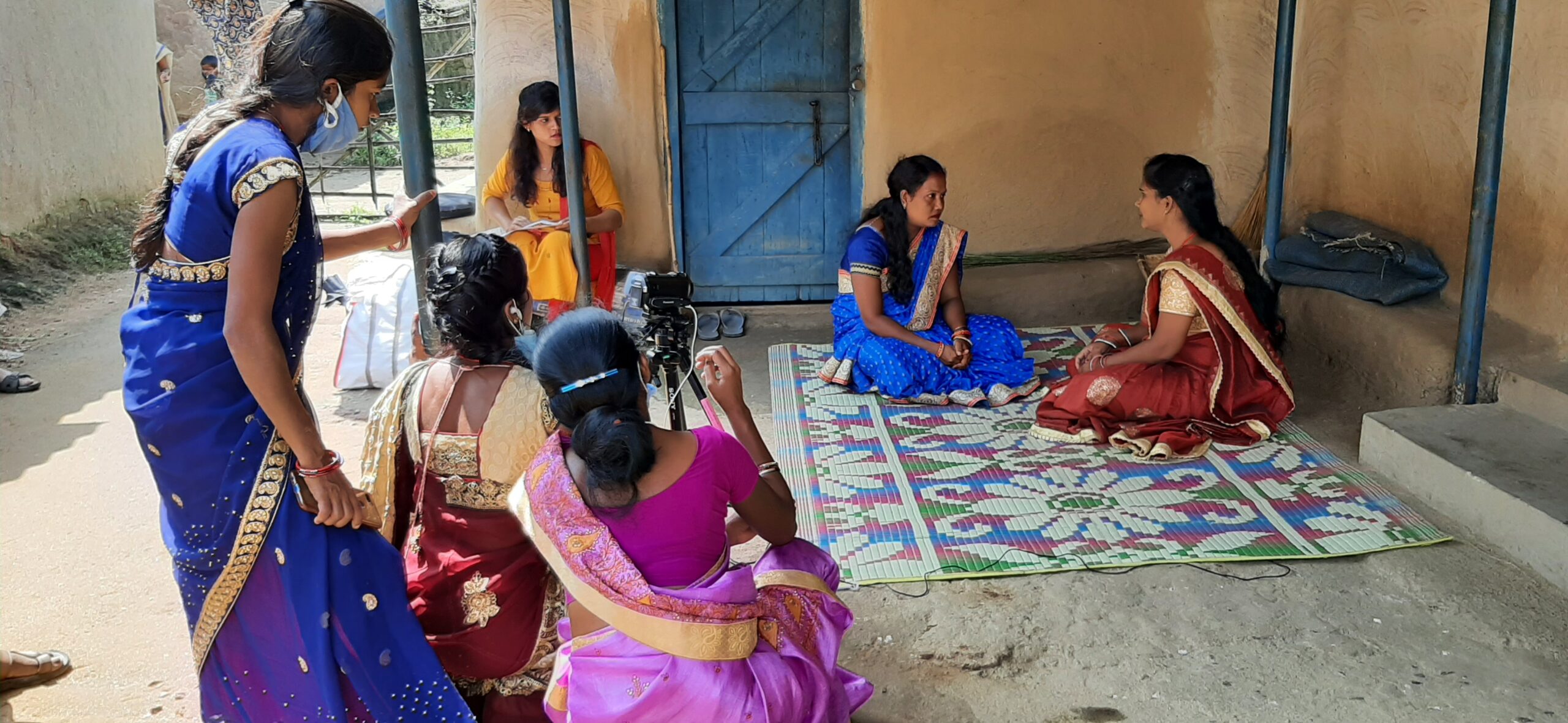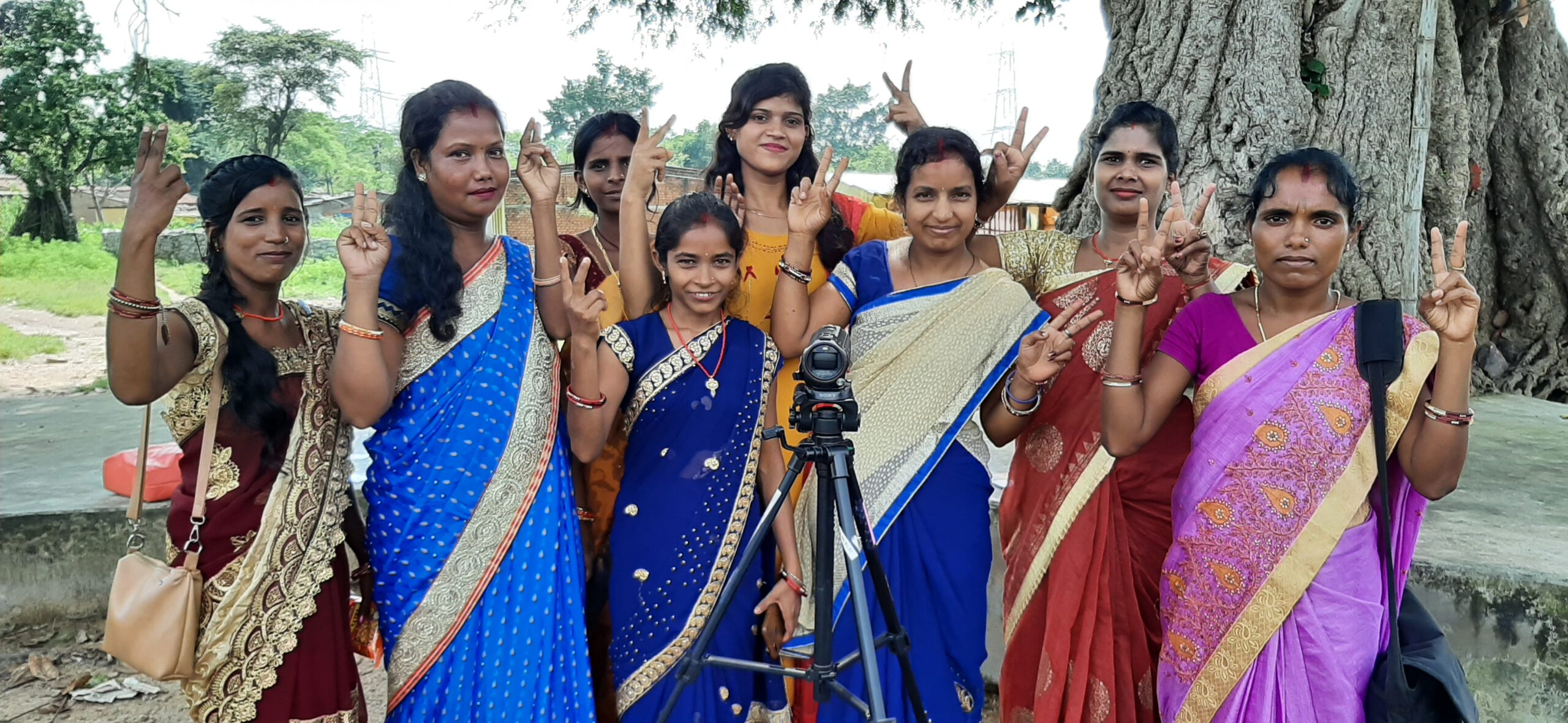To learn more about Digital Green’s AI-powered platform and how it impacts small-scale farmers in India, Ethiopia, Kenya, Nigeria and Brazil, we encourage you to sign up for our newsletter.
Advancing the livelihoods and resilience of women farmers in India

Gender Inequalities in Agriculture: A Context
“When technology reaches a man, it serves the man. When it reaches a woman, it serves the entire family and her community. There is an urgent need to engender digital connectivity and digital technology to have a snowballing impact”
Women small-scale producers across India lack the information, and agency to lead resilient and sustainable livelihoods. As compared to their male counterparts, women farmers have significantly lower literacy rates, and lesser access to resources, advisory, and competitive markets, often receiving as little as 25% of their crops’ final sales price. The divide only becomes more nuanced when tribal communities and tribal women in particular come into the picture.
In the country, tribal majority areas are the most poverty stricken areas and are primarily dependent on forests, agriculture and livestock as their source of livelihood. In most cases agricultural extension and agronomic advisories do not even reach the particularly vulnerable tribal groups (PVTGs) in India.
Even as gender-related inequalities continue to marginalize women in agriculture, the agriculture sector in itself is going through a change. Agriculture value chains are becoming increasingly digitized by making technology more accessible and affordable for several communities to solve pressing challenges such as access to markets, readily available information about climate, soil, and crops. The strong gender digital divide with women having limited access to technology could further exclusion of women from policy and practice.
What could be a way forward?
Farmer Producer Organizations (FPOs) are becoming the fulcrum for improving farmers’ bargaining power in India, and can unlock the benefits of group purchases and sales in competitive markets. Women-focused groups could potentially enhance women’s agency in decision making, bringing more equity in their access to markets, reduce production costs, and increase incomes.
 At Digital Green, pairing scaleable, and high quality agricultural & post-harvest advisory and mobile coaching with our FPO strengthening and data-sharing solution Kisan Diary Enterprise could significantly improve FPO performance and support buyer discovery and aggregation of commodities for sale. This is what is taking place in the Advancing Tribal Livelihoods and Self Reliance (ATLAS) project in Odisha and Jharkhand, where tribal communities make up nearly 50% of the population.
At Digital Green, pairing scaleable, and high quality agricultural & post-harvest advisory and mobile coaching with our FPO strengthening and data-sharing solution Kisan Diary Enterprise could significantly improve FPO performance and support buyer discovery and aggregation of commodities for sale. This is what is taking place in the Advancing Tribal Livelihoods and Self Reliance (ATLAS) project in Odisha and Jharkhand, where tribal communities make up nearly 50% of the population.
Digital advisories are specifically targeted towards tribal women farmers to equip them with information to meet the market demands. By building the capacities of frontline extension agents on video production and dissemination, community videos will help women get information necessary to prepare their harvests and forest products. With FPO interventions and leadership capacity building, these resilient groups of women small scale producers would also be able to confidently navigate market opportunities through collective sales.
Our Journey so far
Since the launch of the ATLAS Project in mid-2021, Digital Green has conducted community mobilization and video production and dissemination training with Community Resource Persons (CRP) in Odisha and Jharkhand. Even at a foundational stage, the impact that these training and dissemination workshops have had on the community resource persons are commendable.
Videos that tell stories: Malati Mohanta’s Experience in Odisha
Malati Mohanta in Odisha has been a CRP under Odisha’s PVTG Empowerment and Livelihoods Improvement Program since 2019, and has majorly contributed in improving living conditions of particularly vulnerable tribal women in the field.
Considered as one of the most competent CRPs by the block officials, her impact on the community has been extraordinary with respect to community mobilization and capacity building training of tribal women. Through conducting Self-Help Group (SHG) meetings, she educates women on relevant agricultural practices, and provides support on market linkages. In December 2021, Malati also received Digital Green’s video dissemination training.
Having previously worked on a similar project with Centre for Youth and Social Development (CYSD), she was well versed in Digital Green’s community video approach and had already trained 200+ tribal women on videos related to vaccination and livestock farming. Then and even now, the village level communities have shown interest in the innovative approach of community videos because of how unique it is, and are eager to adopt practices that are demonstrated.
Malati recalls a challenge she had faced – “earlier women were very hesitant and showed little interest in adopting new practices because they felt that they did not have the resources to do so.” With consistent efforts on her part, Malati has popularized the community videos within the community because this information gets shared in the form of stories which holds the interest of women.
A step towards giving decision-making power to women’s FPOs: Munita Oraon’s Experience in Jharkhand
 Since 2019, Munita Oraon has been working as an ‘AKM (Ajeevika Krishak Mitra)’ in her village. This role includes mobilizing, and training her community on best agricultural practices. Until a few months ago, a major challenge was that community members did not really apply the practices they learned and there was little buy-in on technology being used for agriculture. Recently, with micro-practice-based community videos, the response has changed. “Community members now believe that what is being shown in the videos is actually applicable and possible in their settings.”
Since 2019, Munita Oraon has been working as an ‘AKM (Ajeevika Krishak Mitra)’ in her village. This role includes mobilizing, and training her community on best agricultural practices. Until a few months ago, a major challenge was that community members did not really apply the practices they learned and there was little buy-in on technology being used for agriculture. Recently, with micro-practice-based community videos, the response has changed. “Community members now believe that what is being shown in the videos is actually applicable and possible in their settings.”
Munita received video dissemination training in October 2021. So far, she has been able to disseminate videos, in person and via WhatsApp groups, about crop advisory, producer groups, farmer producer companies, etc. This has not just increased knowledge but has also given decision-making power to women producer group members.
Looking ahead
Over the life of the project, ATLAS will reach 50,000 women with targeted advisories and improve the participation of FPO members in group sales. Our target is also to see that at least 5,000 women participate in a transaction and get an enhanced income after selling their produce.
ATLAS is implemented with the generous support from the John D. and Catherine T. MacArthur Foundation.